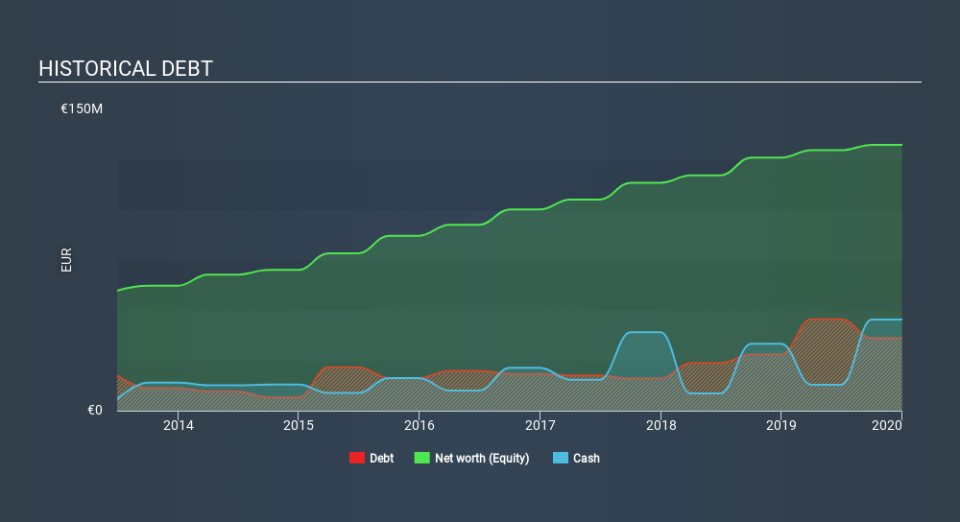Is Jensen-Group (EBR:JEN) A Risky Investment?

Warren Buffett famously said, 'Volatility is far from synonymous with risk.' So it seems the smart money knows that debt - which is usually involved in bankruptcies - is a very important factor, when you assess how risky a company is. Importantly, Jensen-Group NV (EBR:JEN) does carry debt. But is this debt a concern to shareholders?
Why Does Debt Bring Risk?
Debt assists a business until the business has trouble paying it off, either with new capital or with free cash flow. In the worst case scenario, a company can go bankrupt if it cannot pay its creditors. However, a more common (but still painful) scenario is that it has to raise new equity capital at a low price, thus permanently diluting shareholders. By replacing dilution, though, debt can be an extremely good tool for businesses that need capital to invest in growth at high rates of return. The first step when considering a company's debt levels is to consider its cash and debt together.
Check out our latest analysis for Jensen-Group
How Much Debt Does Jensen-Group Carry?
You can click the graphic below for the historical numbers, but it shows that as of December 2019 Jensen-Group had €36.1m of debt, an increase on €28.0m, over one year. However, its balance sheet shows it holds €45.4m in cash, so it actually has €9.30m net cash.
How Strong Is Jensen-Group's Balance Sheet?
The latest balance sheet data shows that Jensen-Group had liabilities of €95.2m due within a year, and liabilities of €49.1m falling due after that. Offsetting these obligations, it had cash of €45.4m as well as receivables valued at €114.9m due within 12 months. So it can boast €16.0m more liquid assets than total liabilities.
This surplus suggests that Jensen-Group has a conservative balance sheet, and could probably eliminate its debt without much difficulty. Simply put, the fact that Jensen-Group has more cash than debt is arguably a good indication that it can manage its debt safely.
The modesty of its debt load may become crucial for Jensen-Group if management cannot prevent a repeat of the 30% cut to EBIT over the last year. Falling earnings (if the trend continues) could eventually make even modest debt quite risky. The balance sheet is clearly the area to focus on when you are analysing debt. But ultimately the future profitability of the business will decide if Jensen-Group can strengthen its balance sheet over time. So if you want to see what the professionals think, you might find this free report on analyst profit forecasts to be interesting.
But our final consideration is also important, because a company cannot pay debt with paper profits; it needs cold hard cash. While Jensen-Group has net cash on its balance sheet, it's still worth taking a look at its ability to convert earnings before interest and tax (EBIT) to free cash flow, to help us understand how quickly it is building (or eroding) that cash balance. During the last three years, Jensen-Group produced sturdy free cash flow equating to 54% of its EBIT, about what we'd expect. This cold hard cash means it can reduce its debt when it wants to.
Summing up
While it is always sensible to investigate a company's debt, in this case Jensen-Group has €9.30m in net cash and a decent-looking balance sheet. So we don't have any problem with Jensen-Group's use of debt. When analysing debt levels, the balance sheet is the obvious place to start. However, not all investment risk resides within the balance sheet - far from it. Take risks, for example - Jensen-Group has 1 warning sign we think you should be aware of.
When all is said and done, sometimes its easier to focus on companies that don't even need debt. Readers can access a list of growth stocks with zero net debt 100% free, right now.
Love or hate this article? Concerned about the content? Get in touch with us directly. Alternatively, email editorial-team@simplywallst.com.
This article by Simply Wall St is general in nature. It does not constitute a recommendation to buy or sell any stock, and does not take account of your objectives, or your financial situation. We aim to bring you long-term focused analysis driven by fundamental data. Note that our analysis may not factor in the latest price-sensitive company announcements or qualitative material. Simply Wall St has no position in any stocks mentioned. Thank you for reading.


